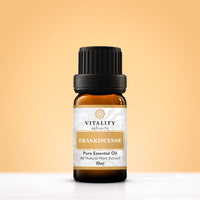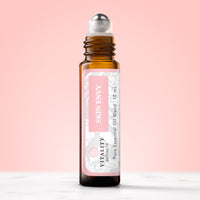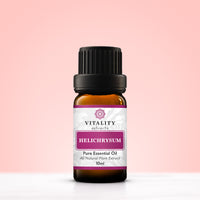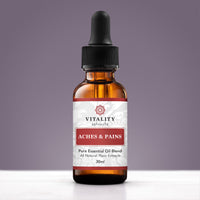
Carrier Oil Spotlight: Fractionated Coconut Oil vs Jojoba Oil
Carrier oils are important for using essential oils safely. They help dilute strong essential oils so they can be applied to skin. Let's compare two popular carrier oils: fractionated coconut oil and jojoba oil.
Key Takeaways
| Feature | Fractionated Coconut Oil | Jojoba Oil |
|---|---|---|
| Best for | Very dry skin, deep conditioning | Oily/acne-prone skin, hair styling |
| Texture | Very light, quick-absorbing | Light, absorbs well |
| Shelf life | Very long | Long |
| Versatility | High | High |
Understanding Carrier Oils
Carrier oils are vegetable oils used to dilute essential oils before putting them on skin. They're called "carriers" because they carry the essential oil onto the skin. These oils are important in aromatherapy and skincare. They allow essential oils to be used safely while also being good for your skin.
Carrier oils dilute essential oils and help them absorb into the skin. This is important because essential oils are very strong and can irritate skin if used directly. Mixing them with a carrier oil makes them safe to use and lets you get the benefits of both the essential oil and the carrier oil.
Here's a quick comparison of our spotlight oils:
| Feature | Fractionated Coconut Oil | Jojoba Oil |
|---|---|---|
| Texture | Light | Light |
| Absorption | Quick | Quick |
| Greasiness | Non-greasy | Non-greasy |
| Pore-clogging | No | No |
| Shelf Life | Long | Long |
| Scent | Neutral | Slight nutty |
| Skin Type Suitability | All | All |
| Essential Oil Dilution | Excellent | Excellent |
Fractionated Coconut Oil: Nature's Moisturizer
Fractionated coconut oil is a type of coconut oil that's been processed to remove all the long-chain fatty acids, leaving only the medium-chain fatty acids. This makes it stay liquid at room temperature and last a long time. It's like regular coconut oil's lighter, more versatile cousin!
This oil is great at moisturizing skin. It's light, not greasy, and soaks in quickly. It doesn't clog pores, so it's good for all skin types. People who use essential oils like it because it spreads easily and doesn't have a strong smell that might mix with the essential oil scents.
Fractionated coconut oil has caprylic and capric acids, which can help fight germs. This makes it good for skin health, possibly helping to protect against harmful bacteria. Because it's so light, it's also great for moisturizing faces, especially for people with normal to dry skin.
You can find good quality fractionated coconut oil in Vitality Extracts' carrier oil collection. It's perfect for making your own massage oils, body lotions, or hair treatments.
Jojoba Oil: The Skin's Best Friend
Jojoba oil is actually a liquid wax, not a true oil. But don't let that confuse you - it's amazing for your skin and hair! What's special about jojoba oil is that it's very similar to the oil our skin naturally makes. This means your skin recognizes it and knows just what to do with it.
Jojoba oil doesn't clog pores, which is good news for all skin types, even oily and acne-prone skin. It can actually help balance the oil your skin produces. For hair, it can make it shiny and help control frizz without making it greasy.
This oil has vitamins E and B, and minerals like copper and zinc. These nutrients help reduce inflammation and heal skin, which can be good for conditions like eczema and psoriasis. Jojoba oil also has a natural SPF of about 4, giving a little bit of sun protection.
You can find pure, high-quality jojoba oil in Vitality Extracts' carrier oil range. It's great for face serums, hair treatments, and mixing with essential oils.
Fractionated Coconut Oil vs Jojoba Oil: The Showdown
Both oils are great, but they have some key differences:
Composition
Coconut Oil: Light, quick-absorbing
Jojoba Oil: Heavier, absorbs well
Skin Benefits
Coconut Oil: Great for dry skin
Jojoba Oil: Balances oily skin
Hair Benefits
Coconut Oil: Deep conditioning
Jojoba Oil: Adds shine, tames frizz
Shelf Life
Coconut Oil: Very long
Jojoba Oil: Long, but shorter than coconut oil
Composition and texture: Fractionated coconut oil is very light and soaks in quickly. Jojoba oil is a bit heavier but still absorbs well. This difference can affect how they feel on your skin and how they mix with other skincare ingredients.
Skin benefits: Both are great moisturizers. Coconut oil is better for dry skin, while jojoba oil is great for balancing oily skin. Coconut oil can help fight germs on the skin. Jojoba oil is similar to the oil our skin makes naturally, which can help control oil production.
Hair benefits: Coconut oil can soak into the hair, making it great for deep conditioning. It can help keep hair strong. Jojoba oil is better for adding shine and controlling frizz, sitting on top of the hair to protect it.
Shelf life: Fractionated coconut oil lasts a very long time because of its stable ingredients. Jojoba oil also lasts a long time, but not quite as long as coconut oil. The long shelf life of both oils makes them great for homemade skincare products.
How to Use Fractionated Coconut Oil
Fractionated coconut oil is very versatile. Here are some ways to use it:
- As a carrier oil for essential oils: Mix 2-3 drops of essential oil with 1 teaspoon of coconut oil. This makes it safe to put on your skin.
- As a body moisturizer: Put it on your skin after showering. It will keep your skin hydrated all day.
- For hair: Use it as a leave-in conditioner or mix it with your regular conditioner for extra moisture. It can help make your hair stronger.
- For massage: Use it alone or mix with essential oils for a relaxing massage oil. It spreads easily on the skin.
- As a makeup remover: Put some on a cotton pad and gently wipe away makeup. It works well for removing waterproof mascara.
Remember, you don't need to use a lot! Start with a small amount and add more if you need to.
How to Use Jojoba Oil
Jojoba oil is just as versatile as coconut oil. Here's how you can use it:
- As a face moisturizer: Put a few drops on clean skin morning and night. It's good for all skin types, even acne-prone skin.
- For hair: Rub a small amount between your hands and put it on your hair ends to control frizz and add shine. You can also use it on your scalp to help balance oil.
- For nails: Massage into cuticles to keep them soft and healthy. Using it regularly can help prevent hangnails and help nails grow.
- As a carrier oil: Mix with essential oils just like you would with coconut oil. It doesn't have a strong smell, so it won't change the scent of essential oils.
- For lip care: Put a thin layer on your lips to keep them moisturized. It can be especially helpful in dry or cold weather.
Jojoba oil is gentle enough to use every day on most skin types. Because it's similar to the oil our skin makes, it's great for face care routines.
Choosing Between Fractionated Coconut Oil and Jojoba Oil
Picking between these two oils depends on what you need:
- For very dry skin: Choose fractionated coconut oil. It's very moisturizing and can help with dry, flaky skin.
- For oily or acne-prone skin: Jojoba oil might be better. It's similar to skin's natural oil and can help balance oil production.
- For hair: Use coconut oil for deep conditioning, jojoba for daily styling. Coconut oil can soak into the hair, while jojoba protects it from the outside.
- For massage: Fractionated coconut oil spreads more easily, making it good for massages.
- For face care: Many people prefer jojoba oil because it's similar to skin's natural oil and doesn't clog pores.
Remember, you don't have to choose just one! Many people use both oils for different things. You can find both in Vitality Extracts' carrier oil collection.
DIY Recipe: All-Purpose Body Oil
Here's a simple recipe you can try with either oil:
- 1/4 cup fractionated coconut oil or jojoba oil
- 5 drops lavender essential oil (for relaxation and to soothe skin)
- 3 drops frankincense essential oil (for skin health and anti-aging benefits)
- 2 drops peppermint essential oil (for a fresh scent and cooling feeling)
Mix all ingredients in a dark glass bottle. Shake well before each use. Put it on your skin after showering or anytime you need moisture! This mix combines the moisturizing benefits of the carrier oil with the good effects of essential oils, making a nourishing and nice-smelling body oil.
Safety First!
While these oils are usually safe, always do a patch test before using a new oil. Put a small amount on your inner arm and wait 24 hours to check for any reaction. This is especially important if you have sensitive skin or allergies.
Keep your oils in a cool, dark place to keep them fresh longer. Light and heat can make oils go bad over time. When using essential oils, always mix them properly with a carrier oil to prevent skin irritation.
Wrapping Up: Your Carrier Oil Journey
Both fractionated coconut oil and jojoba oil are great carrier oils with their own special benefits. Whether you choose one or both, they'll make your essential oil and skincare routines better. Remember, the best oil is the one that works for you and your skin.
Try both oils to see what works best for your skin and hair. You might find that you like one for your face and another for your body or hair. These oils are versatile, so you can customize your beauty and wellness routine.
Ready to start using carrier oils? Check out Vitality Extracts' collection of high-quality carrier oils. With their range of pure, natural oils, you can make your own personalized skincare and aromatherapy mixes. Happy mixing!
















































